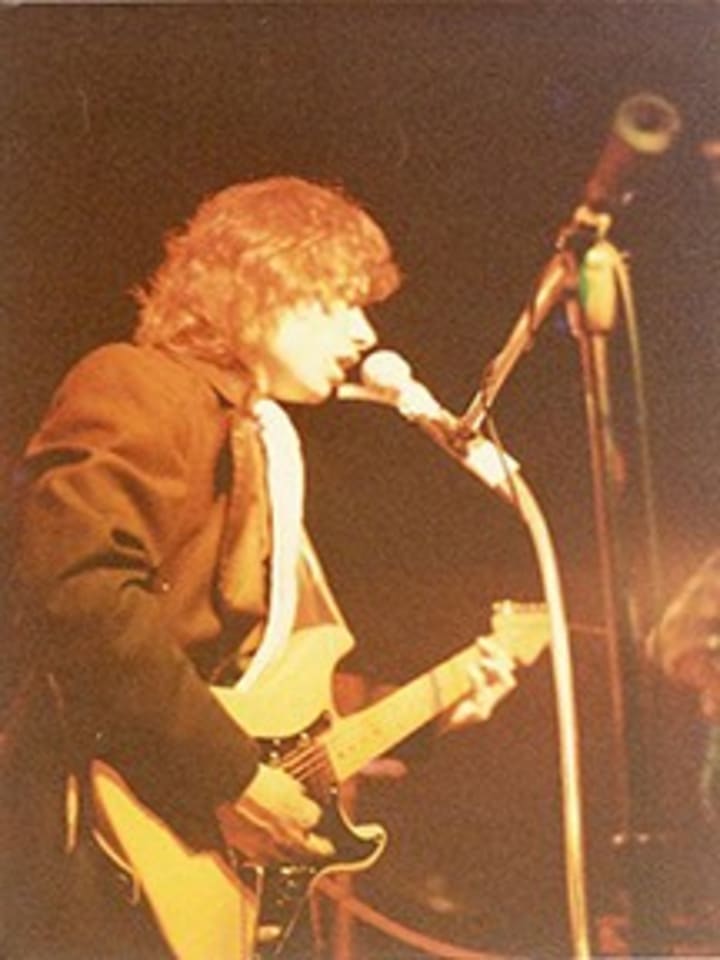The Right Place at the Right Time
from Jimmy Page to Nelson Mandela — my life in rock n’ roll

The Right Place at the Right Time
Was your music/writing/media career locked up in a gatekeeper's vault filed under a "secret" and a "who?"
Your contribution to the muse deserves merit. Even if you do have to toot your own horn. Do I sound a bit snarky? So I am told. After helping countless artists achieve their goals and there's no reciprocity. Not even a nod of thanks, remembrance or a call back it does rub off and lends itself to being a tad jaded.
The red flag waved but I didn't care. I let the magnet of the stage pull me. Family and friends laughed, bullied, and called my artistic pursuits delusional. I followed the elephant with a shovel. You get the point. Regardless, let's get on with the story.
It's a trial for musicians and the behind the scene shakers who try and write their bios. Lacking a hit song or affiliated with a well-known brand the question is one more of honesty. Versus relevancy and without the latter why bother?
The artist must choose between what he felt mattered and what interests the reader. I will attempt to avoid the pitfalls of writing the melodramatic tic bio. Too long and prone to include details best highlighted in the Forest Gump sequel. To curb my indulgences, I'm going to drop the pronoun "I". And deep dive into 3rd person and pretend Simon Cowell wrote this for my first place winner media tour.
POV is everything in a self-produced documentary.
Since Hennings is not famous let's skip the first instrument bit. The first record that blew his cork. And like most aspiring rockers how watching the Beatles on Ed Sullivan changed his life.
In his hometown of Minneapolis, disco fever finally ran its course, cooled off, and died out by 1979. The growing influence of punk and new wave music, which overlapped the disco era.
At first, Hennings didn't understand the raw edge. Back-to-the-rock basics of punk's three-chord guitar style. But the energy, rebelliousness, and spirit of the sound hooked him. Then, catching the new wave, he finally found a way to plug back into his own music.
The explosive success of Prince. Minneapolis, like Seattle, became a great spawning ground for new music. The music scene became known in the press as the "Minneapolis Sound."
Nicknamed the "third coast." And the "Nashville of the North." The Minneapolis music scene exploded into an impressive underground economy. Consisting of hundreds of clubs, bands, agents, studios, managers, distribution, and record companies.
Hennings worked with many of them.
In 1968, the 19-year-old owner of the Prison Dance Hall gave the 14-year old Hennings his first job in the music biz. And, until he couldn't count the change back, sold pop, checked coats, and took door fees. The business looked easy from Hennings' vantage point. The venue sold out. When the show was over the band got a percentage of the door money.
Woodstock was next. The event had shown him more than any other music festival of the time. The possibilities of bringing together people through music. The idea of raising social awareness. And creating personal harmony through music stuck with him. It became his lifelong ambition.
55 different jobs between.
Hennings started a local band called Vitamin Q. He played lead guitar during its five-year run. Playing new wave hits of the era and a few originals, the band became a popular act in the Midwest. One of the first bands to play the legendary Jay's Longhorn. Vitamin Q's original claim to fame came from Hennings' song "Me Magazine." In 1981, the song appeared on the "Best of the Twin Cities Beat" album and TV show.
Walking the music biz-walk. And talking the music biz-talk would take place at the CBGB's of the Midwest. The Longhorn. The Longhorn was Hennings first public performance. His band Vitamin Q played original songs.



Pulling on experience from his rock festival days. Hennings helped to transform the group's warehouse space into a concert hall. The space provided free access to original groups. Their space became known as "On Broadway." It gained recognition as a critical spawning ground for developing talent. In 1981, the D'Art Magazine, Minnesota Daily, Vol. 2, №25, Feb 4, published a feature article on the venue called, "Q Could Stand for Question Mark.

From 1979–1985 Vitamin Q remained a question mark. Vitamin Q disbanded in 1985.
In Mid 80s, in the middle of the Wedge neighborhood, Hennings had an 8-track recording studio. He chose to lend a hand to artists. Provide opportunities for those less gifted in carving a niche for themselves. which helped to preserve fine expressions of the spirit calling unto itself.

Hennings recorded a double album and accompanying a 40-page story. Titled, Burden of the Beat: The Eyelid Movie - a libretto that parodied the idea of wanting to be a rock star. The project received favorable reviews. The Minnesota Historical Society documented the work (AV collection disc #175-A). The Plains Art Museum in Moorhead, Minnesota, a grant to exhibit the multimedia piece. The Minneapolis Star and Tribune. The Saint Paul Pioneer Press nominated the work for their top-10-picks of that year.
In 1986, Hennings became the sales manager for Mill City record distributors. As the sales manager. He promoted and distributed over 100 national and local independent labels. Including, a fledgling new label. Owned by school teacher turned music entrepreneur Bob Feldman. Feldman named the label Red House after his house. Red House records became one of the most famous folk labels in America. Feldman called Hennings daily for reassurance on his first Greg Brown release.
Believing in the commercial potential of several Minneapolis songwriters. In 1989, Hennings shopped their music to Los Angeles record companies. No connections. $500 limit VISA card. Months behind on his $350 per month rent, and a car borrowed from his dad, he banged on the doors of Hollywood for months. Finally, the President of PolyGram International Music Publishing liked what he heard. And signed his company to a production deal. It was his first major success story in the music business.
From the flame of a hamburger grill to a music industry giant. The St. Paul Pioneer Press ran a feature on his accomplishment. The press called it one of the most significant boons to happen to the Minneapolis music scene. His contract stipulated that he was to find and develop talent who could produce tomorrow's hits. In other words an A&R man (talent scout). The details of that story in the essay below.
The Article

Hennings moved into former Prince manager, Owen Husney's office. During his time as co-publisher and A&R man. Hennings placed several artists on major labels. He also helped the independent label Twin Tone Records. A new distribution deal with Restless records avoided Bankruptcy.
Hennings filled local attorney offices and recording studios with his business. In 1990, the Minnesota Music Academy asked him to present the Artist of the Year Award. Ann Reed, Red House Records winner.
The record labels. Capitol. Decca. Def Jam. Deutsche Grammophon. Interscope. Island, Motown, Polydor, Republic, Virgin and EMI merged into one monster. In 1991, Universal Music (UMG) was born - the largest monopoly on creativity. Universal controlled the markets, distribution, radio, media, venues, and worse shape pop culture.
Driving the proverbial rock n' roll nail into the music coffin. LIVE NATION and TICKETMASTER controlled the venue business. And (4) media giants bought up radio. The day of the INDIE was dead. If you weren't part of the new music mafia your chances for success in the music business weren't too promising. The one thing they wouldn't be able to control was Prince.
The Minneapolis Sound that set the charts on fire. And sparked a lasting effect on songwriting ended in one, long, sustained Dove cry. Prince who became the artist "formerly known as Prince," died on April 21, 2016. With him died the countless parties, deals, hopes, songs, and groundbreaking videos. The collapse of the purple wave. The zeitgeist of the Minneapolis '80s music scene seemed to disappear.
The wave of change didn't spare Hennings. In 1992 his contract with PolyGram ended.
Afterward, Hennings felt nothing was ever the same again. What rained down was not purple. Nostalgic media downpoured on what was. Twin Tone records shuttered its doors. Bands broke up like The Suburbs, Replacements, and Husker Du. The famous venue First Avenue fought to stay open. the Longhorn and Duffy's closed. Flyte Tyme flew away. As well as many others throughout the music eco-chain. The Minneapolis Sound "biz" burned out. Or for the most part faded away except a couple Major label signings in the early 90s like Babes in Toyland.
He tried to remain relevant with several local music business start-ups. Names you never heard of. He wrote the music business curriculum for a music school.
Hennings did not lose sight of his original Woodstock dream. To raise social awareness and create interpersonal harmony through music. There would be more songs and other artists? The drum would beat again but, for how long, and where would he have to go to find it?
It was time to rebuild and re-evaluate the next step on the long and winding road of show biz. Now in his 40s, a bit long-tooth for show biz, and starting over again.
Hennings welcomes a new year (author owned video).
Starting over included a 4-year music business-based Baccalaureate of Arts degree. And a Masters Degree in writing. He moved from his ratty, but historic, one-bedroom recording studio apartment. His first child in tow, put Nashville PolyGram Music out of reach. During this time, he held his life together by working various dead-end jobs again. He will never forget the one night, as a limousine driver, he drove Prince and Carmen Elektra to First Avenue.
In 1994, Hennings became Shawn Phillips's (A&M records) manager for 18 years.

Phillips gives special thanks to Hennings LIVE at the MN ZOO (author owned)

Donovan (left), Arlo, Shawn Phillips son, Juliette Phillips wife, Shawn Phillips, Linda Lawrence, Donovan's wife,

Hennings crowning achievement in the music business was supporting South Africa to end Apartheid.
Shawn Phillips retired.
What Hennings does best is help create and nurture music scenes. Minneapolis had run its course and he looked for another place to inject his mojo. He found it halfway around the world in Indonesia.
In 2011, Hennings packed up and moved to Bali. The rest is history. His words published in Indonesian media outlets. Such as the Bali Advertiser, Tirto, and the Indonesian Expat Magazine.) Music contributions found on his Indonesian Jazz label (Indojazzia). Which landed a young pianist from Bali, Eric Sondhy, on worldwide music charts. Curator for the music podcast show 107.3 2Ser Australia. Featuring the latest in cutting edge music from the Indonesian archipelago. The first foreigner in the Indonesian music awards (AMI).

Hennings also managed the International Indonesian band, I Know You Well Miss Clara. Finally, he was the Director of Business Development for the Ubud Concert Series. And the Indonesian Music Expo (IMEX).
In 2016 Hennings published a memoir called "Guitarlo." In 2021 the Bali stories part of the book was published by Medium/Illumination Books. "How to Drink Yourself to Death in Bali."
About the Creator
Arlo Hennings
Author 2 non-fiction books, music publisher, expat, father, cultural ambassador, PhD, MFA (Creative Writing), B.A.






Comments
There are no comments for this story
Be the first to respond and start the conversation.